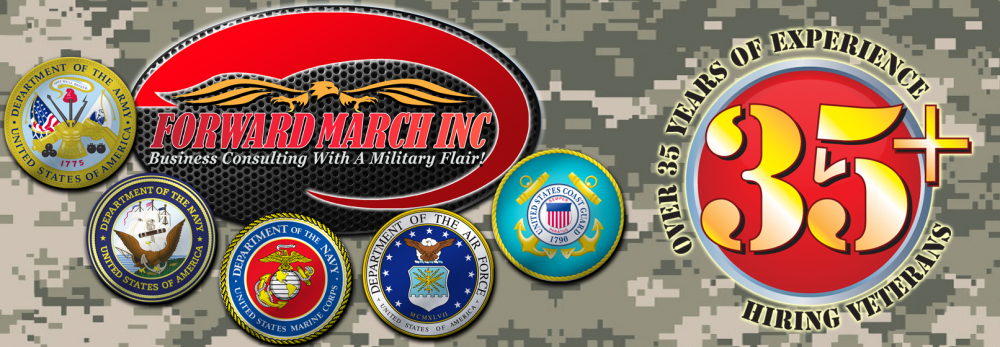Forward March Inc. is an SDVOB (Service Disabled Veteran Owned Business). We are a company of veterans helping veterans. Today we would like to share with veterans and transitioning military personnel some valuable tools for employment, education and transition. You can find these valuable tools and more on our website here…
Military Veterans:
Department of Veteran’s Affairs
Veteran’s Gold Card – The Gold Card provides unemployed post 9/11 veterans with intensive and follow-up services needed to succeed in today’s job market. The God Card initiative is a joint effort of the DoL Employment and Training Administration (ETA) and the Veterans’ Employment and Training Service (VETS).
Department of Labor Vets Program
America’s Service Locator – Find workforce services in your area nationwide.
Official Wounded Warrior Programs:
Navy Wounded Warrior – Safe Harbor
National Resource Directory – Connecting Wounded Warriors, Service Members, Veterans, Their Families and Caregivers with Those Who Support Them.
VetSuccess– VetSuccess is sponsored by the U.S. Department of Veterans Affairs and provides the opportunity for veterans to post resumes, and for employers to post job openings as well as links directly to Vocational Rehabilitation and Employment (VR&E) national employment resources for employers.
Veterans Administration Assistance for Homeless Veterans
VA Benefits for Veterans Dependents and Survivors
The work opportunity tax credit – Veterans Brochure
Transitioning Military:
The US Army has the COOL program – “COOL (Credentialing Opportunities On-Line) helps Army Soldiers find information on certifications and licenses related to their Military Occupational Specialties (MOSs). COOL explains how Soldiers can meet civilian certification and license requirements and provides links to numerous resources to help get them started.”
The US Navy also has the COOL program for their service members.
Active duty military personnel can also get matched with potential employers before they get out making for a smooth transition from their military career to their civilian career. Military personnel can go to their respective service branch military transition program for matching transitioning military with potential employers.
Currently the US Army is using the Transition Assistance Program (TAP), which provides job assistance and separation counseling for soldiers and their families.Soldiers can learn more about this program at the official TAP site
The Marine Corps Transition Readiness Program
The US Navy uses a program called Transition GPS
The US Air Force Transition Assistance Program
The US Coast Guard Office of Work-Life Programs –Transition Assistance Program (TAP)
Employment Tools:
Real Strength – Resume and Interviewing information and much more
U.S. DOL Employment Workshop – Transition from Military to Civilian Workforce – Guide
TAP Manual (note: this is the 2001/2003 version)
Navy Transition Guide TGPS Overview Pre-Separation Counseling Checklist
Employment Outlets and Resources:
Private sector effort to hire veterans – http://www.servicelocator.org/
Locate veterans at an American Job Center near you –http://www.uschamberfoundation.org/form/hiring-500000-heroes
Business Center at CareerOneStop – http://www.careeronestop.org/businesscenter/index.aspx
Disabled American Veterans (DAV) – http://www.dav.org/
The Army Women’s Foundation – http://www.awfdn.org/
If you are interested in energy and are interested in a Federal job check out Energy.gov
Sunday, March 15th was the 96th birthday of The American Legion.

The March 1919 Paris Caucus set in motion The American Legion.
The American Legion was chartered by Congress in 1919 as a patriotic veterans organization. Focusing on service to veterans, service members and communities, the Legion evolved from a group of war-weary veterans of World War I into one of the most influential nonprofit groups in the United States. Membership swiftly grew to over 1 million, and local posts sprang up across the country. Today, membership stands at over 2.4 million in 14,000 posts worldwide. The posts are organized into 55 departments: one each for the 50 states, along with the District of Columbia, Puerto Rico, France, Mexico and the Philippines.
Over the years, the Legion has influenced considerable social change in America, won hundreds of benefits for veterans and produced many important programs for children and youth.


